Some of the obituaries were glowing, some less so. Some mentioned his less savoury moments – his keenness to advise General Pinochet in Chile, at the height of his oppressive regime, for example – some didn’t. But few of them took much of a step back to examine his real global legacy.
Not that Milton can be blamed for all of this, of course. He just developed the ideas – others, from Reagan to Thatcher, via a clutch of unsavoury US-supported dictators (not including Tony Blair, though he’s one of Milton’s cronies too) actually put them into practice. But the model he helped to create – that of unfettered markets, corporate power and a one-size-fits-all economic model in which price trumps value every time – is now so dominant that it can seem unstoppable.
It is Milton’s model which is responsible for the immoral machine that is the modern corporation – a world-bestriding colossus, bigger in some cases than the nation state – which helps write the rules of the global economy and yet claims no aim or responsibility beyond the reaping of financial dividends. It is Milton’s model which is responsible for a worldview in which pretty much anything can be justified in the name of growth, development or international competitiveness. And it is Milton’s model which is, consequently, responsible for the accelerating destruction of the natural world, and the accelerating spread of values – greed, selfishness and atomisation – which are inimical to any kind of harmonious existence. Thanks, Milton. Nice work.
It’s always worth remembering, though, how quickly things can change. Back in the sixties and seventies, Milton and his Chicago Boys were thought of, if they were thought of at all, as a small group of wacky extremists, whose ideas were never likely to gain much credence. These days, those ideas rule the world and it’s people like us who are seen as the weirdos, as we spend our time vainly trying to clean up after them.
So, the next time you’re despairing at the state of the world, remember the real lesson that Milton’s life can teach us greenies: all ideas start small, and just because people laugh at you now, doesn’t mean they won’t be agreeing with you later. When they do, of course, they’ll pretend they thought like that all along. But that’s the price you pay for getting there first. Just ask Milton.
http://www.paulkingsnorth.net/
This article first appeared in the Ecologist December 2006







